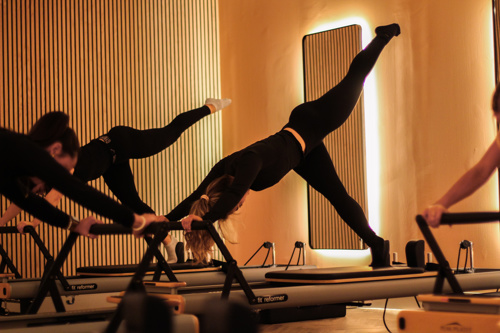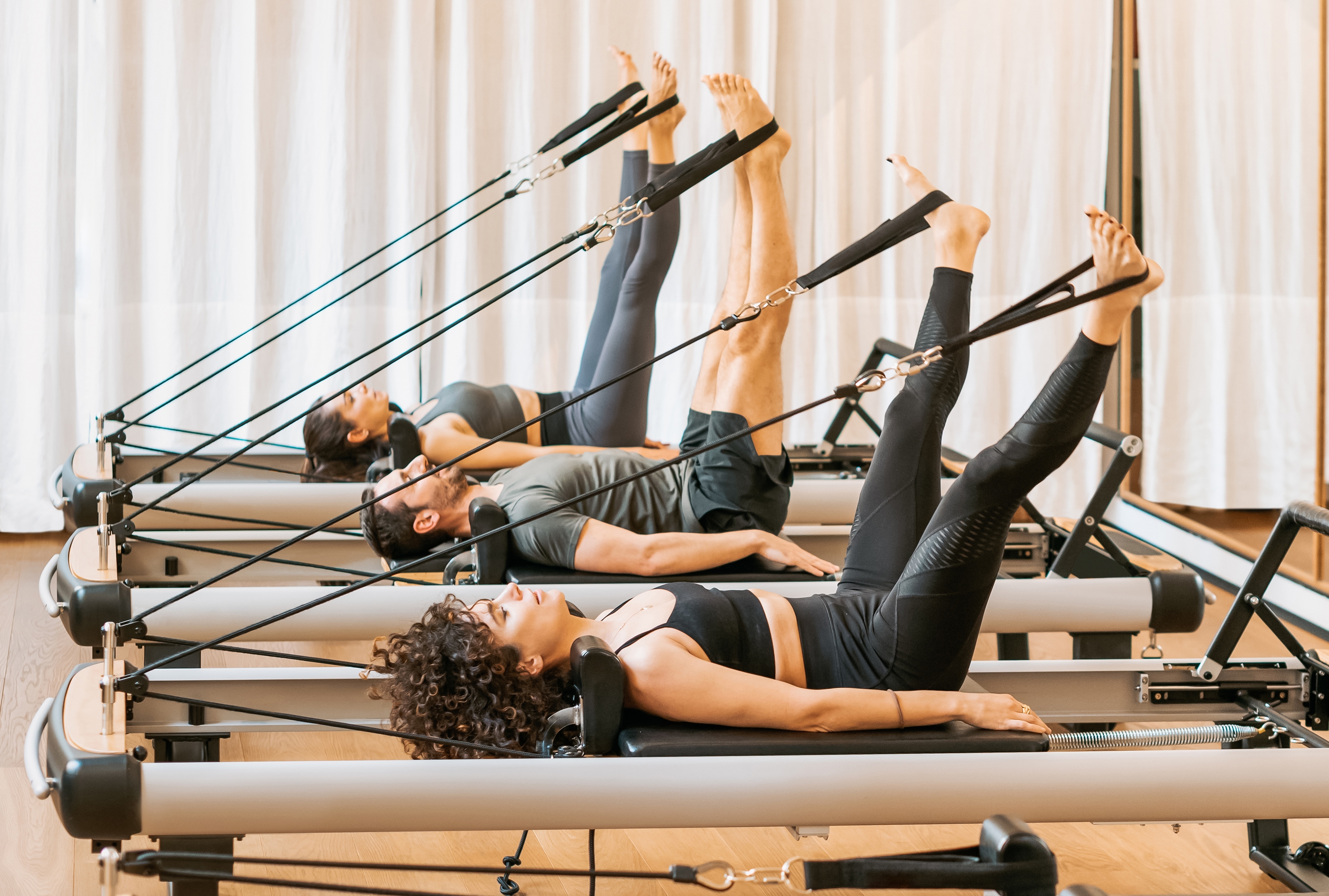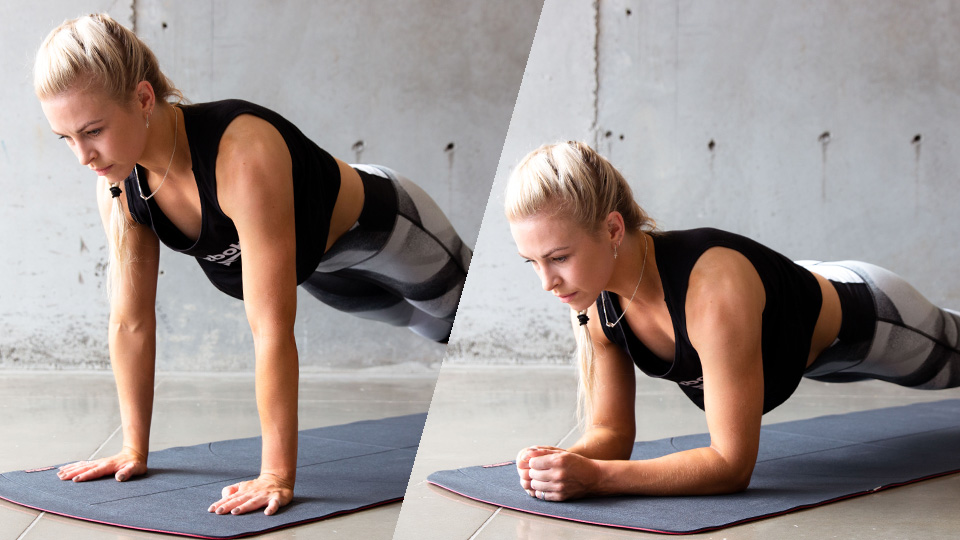Reformer Pilates offers a dynamic workout with numerous benefits, including enhanced flexibility, balance, and posture. However, if your main goal is to build muscle, you might wonder whether Reformer Pilates qualifies as strength training or if there are better options available to meet your goals.
At Village Gym, we’re proud to offer a wide variety of fitness sessions, ranging from targeted strength training to Reformer Pilates classes. This often raises a common question: Is Reformer Pilates considered "strength training"? The answer, like many aspects of fitness, isn’t straightforward.
Let’s take a closer look at how this popular full-body workout compares to traditional weightlifting, how it contributes to strength building (and how it differs), and how you can leverage its benefits to achieve your specific fitness goals.
What is Strength Training?
When we refer to strength training, we're usually talking about exercises that use resistance to enhance muscle strength, endurance, and size.
This can include lifting weights like dumbbells and using weight machines, performing bodyweight exercises such as push-ups and squats, or utilising resistance bands to create tension during various movements.
The key goal is to gradually push your muscles, allowing them to adapt and become stronger over time, while also enhancing your overall functional fitness and metabolic health.
Where Does Reformer Pilates Fit In?
Reformer Pilates offers a distinct method of strength training that sets itself apart from conventional weightlifting. While you may not be lifting extremely heavy weights like in powerlifting, Reformer Pilates is excellent for building muscular endurance, which is the ability of your muscles to maintain contractions over extended periods. The focus on slow, controlled movements and precise form enhances muscular control and body awareness.
This form of Pilates is particularly known for its effectiveness in activating and strengthening deep core muscles—often referred to as your "powerhouse"—as well as other stabilising muscles that are frequently neglected in conventional strength training. These muscles play a vital role in maintaining good posture, balance, preventing injuries, and supporting overall functional movement in everyday life.
Unlike traditional weight machines that isolate specific muscles, Reformer Pilates exercises typically engage multiple muscle groups at once, leading to a more balanced and integrated full-body workout. The Reformer machine itself uses a system of springs, pulleys, and a sliding carriage to provide resistance. This setup challenges your muscles through various movements, requiring them to work against a load.

How Reformer Pilates Builds Strength
Reformer Pilates strengthens the body in various ways. It improves core stability, enhances alignment, and incorporates controlled, low-impact movements to tone muscles, improve posture, and support functional fitness in daily life.
Functional Strength
The strength you gain in Reformer Pilates is highly functional, meaning it directly translates to improved performance in everyday activities and other sports. Think about how a strong core helps with lifting groceries, running, or even your deadlift form!
By strengthening your core and promoting proper alignment, Reformer Pilates can significantly improve your posture, reducing aches and pains and making you stand taller.
Enhanced Mind-Body Connection
The focus on breath, precision, and controlled movements in Pilates fosters a powerful mind-body connection. This awareness helps you recruit muscles more effectively and understand your body's mechanics better.
Low-Impact but Challenging
For those with joint issues, recovering from injury, or simply seeking a gentler yet highly effective workout, Reformer Pilates offers a low-impact solution that still delivers significant strength benefits.
Muscle Toning and Definition
While it may not lead to the same level of hypertrophy (muscle bulk) as heavy weightlifting, Reformer Pilates can create long, lean, and toned muscles with increased definition.
Benefits of Traditional Weightlifting
While Reformer Pilates excels at creating a sculpted physique and improving muscular endurance, it's worth noting that it won't typically lead to the same significant muscle bulk as heavy weightlifting.
If your goal is maximal muscle size, traditional strength training might be a more direct path. However, for developing a strong, resilient, and highly functional body, Reformer Pilates is an incredibly effective and intelligent way to build muscle.
It's important to note that traditional weightlifting still holds its own unique benefits, particularly if your primary goal is maximal strength gains. For lifting the heaviest possible weight, traditional weightlifting with progressive overload is generally more effective.
If you're aiming to significantly increase muscle size, heavier loads and specific rep ranges in traditional weightlifting are key.
While Pilates can contribute, weight-bearing exercises with heavier loads are highly effective for increasing bone density and preventing osteoporosis.

Does Reformer Pilates Build Muscle?
Yes, Reformer Pilates helps build muscle! It does this by using a smart system of springs and pulleys that allow for adjustable resistance. Every time you move on the Reformer, your muscles have to work against this resistance, engaging them in both shortening (concentric) and lengthening (eccentric) contractions.
These controlled, often slower movements increase the "time under tension" for your muscles, which is crucial for stimulating muscle growth and achieving lean, toned results.
What makes Reformer Pilates unique is its emphasis on functional strength and full-body engagement. Rather than isolating individual muscles, many exercises target multiple muscle groups at once, including those deep stabilizing core muscles that are often overlooked in traditional workouts.
This approach not only builds balanced strength but also enhances posture, flexibility, and overall body awareness, making your daily movements more efficient and helping to reduce the risk of injury.
So, is Reformer Pilates Strength Training?
Reformer Pilates can be considered as a form of strength training as it utilises spring resistance and bodyweight to build strength and muscle endurance. It can be a good option for both beginners and those looking to enhance their strength training routine, particularly for core and postural muscles.
However, if your goal is to build muscle mass, you might consider weight training instead. Pilates is not as effective for muscle growth, but excels at developing and enhancing core strength in the end range of movements, which can help prevent injuries. For instance, someone who can squat 200kg might struggle with multiple reps of a side-lying leg extension, while a person who practices Pilates may not lift heavy weights but can maintain isometric positions for much longer.
Achieve Your Fitness Goals with Reformer Pilates
Whether you're a seasoned gym-goer looking to enhance your mobility and core stability, or new to exercise and seeking a safe and effective way to build strength, Reformer Pilates can be a game-changer.
Many gym enthusiasts add Reformer Pilates to their workout routines to correct muscle imbalances, enhance flexibility, and strengthen their core, which ultimately improves their performance in other activities.
Why not experience the unique challenge and incredible benefits of our state-of-the-art Reformer Pilates studio at Village Gym Reading? You can also find our Reformer Pilates classes across a number of our UK locations. Come and see for yourself how it can help you smash your workout and reach your fitness goals!



